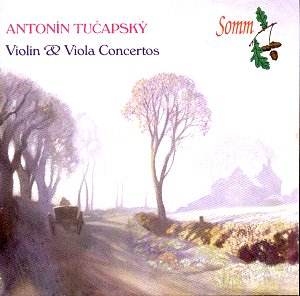Tučapský
has long been a London resident, latterly as Professor of Composition
at Trinity College of Music until his recent retirement. Born
near Brno in 1924 he studied with Jan Kunc, a former pupil of
Janáček and Novak, and was a noted choral conductor – his
performances with the Moravian Teachers Male Voice Choir have
been well documented on disc and indeed I reviewed the Somm disc
that so attractively brought them back to the catalogue. After
his marriage to English soprano Beryl Musgrave, which made him
politically suspect, he lost his professional posts and he and
his wife left for London.
The
two concertos here were written in the last few years of his professorship
at Trinity – the Violin Concerto in 1993 and that for Viola a
few years later in response to a commission from Martin Outram,
viola player of the Maggini Quartet and New London Orchestra.
They are both marvellous examples of his art. The Violin Concerto,
like its companion cast in three movements, opens in quicksilver
fashion, bright and virtuosic until the solo line leans into more
reflective material over a quietly quizzical orchestral patina.
There’s some strong chordal folk influence here and humorously
fluttery or “shaky” work for the soloist with Tučapský constantly
flecking and renewing the humorous sub text. Throughout he keeps
an unimpeachable balance between seriousness and levity, between
orchestral colour and incident and the long line. In the slow
movement (Adagio serio) which opens with the musing violin,
solo, there is an almost lyrical-oratorical intensity to the playing,
pensive introspection from the supportive orchestral forces which
then do, eventually, open out in generous freedom. The journey
ends in sensitive warmth. The finale opens with bustle and percussive
tumult – a fun of the fair elation sweeps one on - open trumpets,
horn calls and plenty of efflorescence. One can just detect some
Janáček-influenced flute writing over the solo pizzicati
before one plunges on again in this intoxicating movement – clip
clop percussion like horse hooves and a strong rustic feeling.
One might think of Moravia, given his nationality, and the winding
roads south from Brno to Bzenec – I also thought of Thomas Hardy
and Wessex. The central panel slows for some reflection and a
moment of anxiety even with the violin singing in alt before –
superbly - there’s a drama-laced dash to the finish.
The
Viola Concerto was inspired by Tučapský’s unease – and more
- at the separation of Czechoslovakia in 1993 into the two separate
republics. But the first movement opens in a jaunty enough fashion
with pleasurable lyricism, the soloist adding his own little fillips
to the orchestral material. Throughout the work, which thrives
on contrastive material we can appreciate Tučapský’s sure
ear for the telling colour and instrumental combination, for the
flow and retardation of the moment – for the
convincing
realisation of structure. In the lyrically plangent slow movement
for example he quotes the Slovak folksong Dobrou noc in
hesitant, fragmentary form, as the viola’s intensely personal
voice is shaded by lower and high winds, until a beautiful string
cantilena courses through the movement. Over sturdy double basses
the first fiddles take up the folk song, brass nobility singing
out assertively not melodramatically. These are moments of concise
emotional charge, specific in inspiration yet general in understanding.
The finale by contrast delves into the world of the Mahlerian
hunting horn, full of Ländler feeling and processional, fizzing
orchestral strings and frequently motoric viola. The soloist flattens
and flutters in his solo line to delicious effect, overcomes some
stern reminiscences and the work ends in well-won triumph.
Sincere
praise goes to the performers for their vitality, sensitivity
and accomplishment and to Somm’s production values. It really
is an exciting, engaging and life-affirming coupling of two splendid
concertos.
Jonathan
Woolf
see
also review
by Rob Barnett
